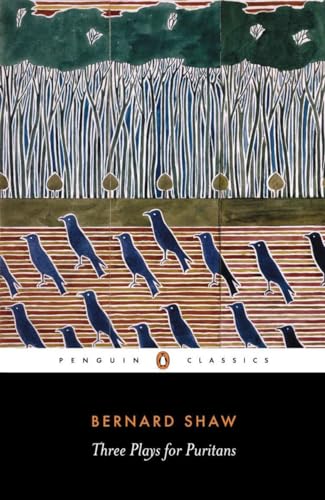Synopsis
Exclusive to Penguin Classics: the definitive text of Shaw’s volume of three plays of ideas, The Devil’s Disciple, Caesar and Cleopatra, and Captain Brassbound’s Conversion—part of the official Bernard Shaw Library
A Penguin Classic
Shaw believed that theatre audiences of the 1890s deserved more than the hollow spectacle and sham he saw displayed on the London stage. But he also recognized that people wanted to be entertained while educated, and to see purpose mixed with pleasure. In these plays, Shaw employed traditional dramatic forms—Victorian melodrama, the history play and the adventure story—to turn received wisdom upside down. Set during the American War of Independence, The Devil's Disciple exposes fake Puritanism and piety, while Caesar and Cleopatra, a cheeky riposte to Shakespeare, redefines heroism in the character of the ageing Roman leader. And in Captain Brassbound's Conversion, an expedition in Morocco is saved from disaster by a lady explorer's skilful manipulation of the truth.
About the Author
George Bernard Shaw (1856–1950) is one of the world’s greatest literary figures. Born in Dublin, Ireland, he left school at fourteen and in 1876 went to London, where he began his literary career with a series of unsuccessful novels. In 1884 he became a founder of the Fabian Society, the famous British socialist organization. After becoming a reviewer and drama critic, he published a study of the Norwegian dramatist Henrik Ibsen in 1891 and became determined to create plays as he felt Ibsen did: to shake audiences out of their moral complacency and to attack social problems. However, Shaw was an irrepressible wit, and his plays are as entertaining as they are socially provocative. Basically shy, Shaw created a public persona for himself: G.B.S., a bearded eccentric, crusading social critic, antivivisectionist, language reformer, strict vegetarian, and renowned public speaker. The author of fifty-three plays, hundreds of essays, reviews, and letters, and several books, Shaw is best known for Widowers’ Houses, Mrs. Warren’s Profession, Arms and the Man, Caesar and Cleopatra, Man and Superman, Major Barbara, Pygmalion, Heartbreak House, and Saint Joan. He was awarded the Nobel Prize in Literature in 1925.
Dan H. Laurence (editor; 1920–2008) was series editor for the works of George Bernard Shaw in Penguin. Formerly a New York University faculty member, Mr. Laurence left his tenured position in 1970 to dedicated his life to the collection and curation of Shaw's life, work, and letters. He served as the official literary advisor to Shaw's estate and published four volumes of his correspondence.
Michael Billington (introducer) has been the drama critic of The Guardian since 1971.
"About this title" may belong to another edition of this title.
